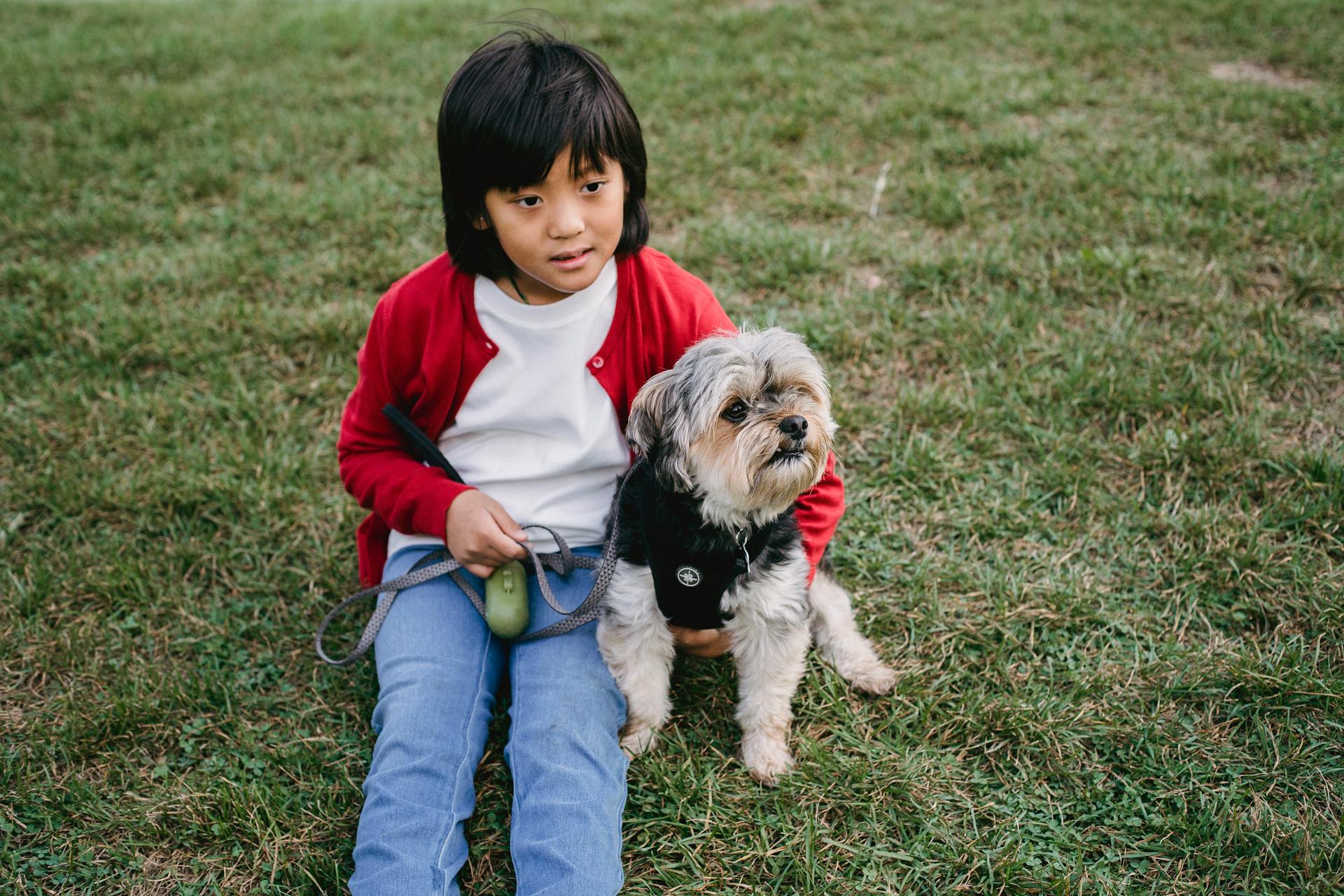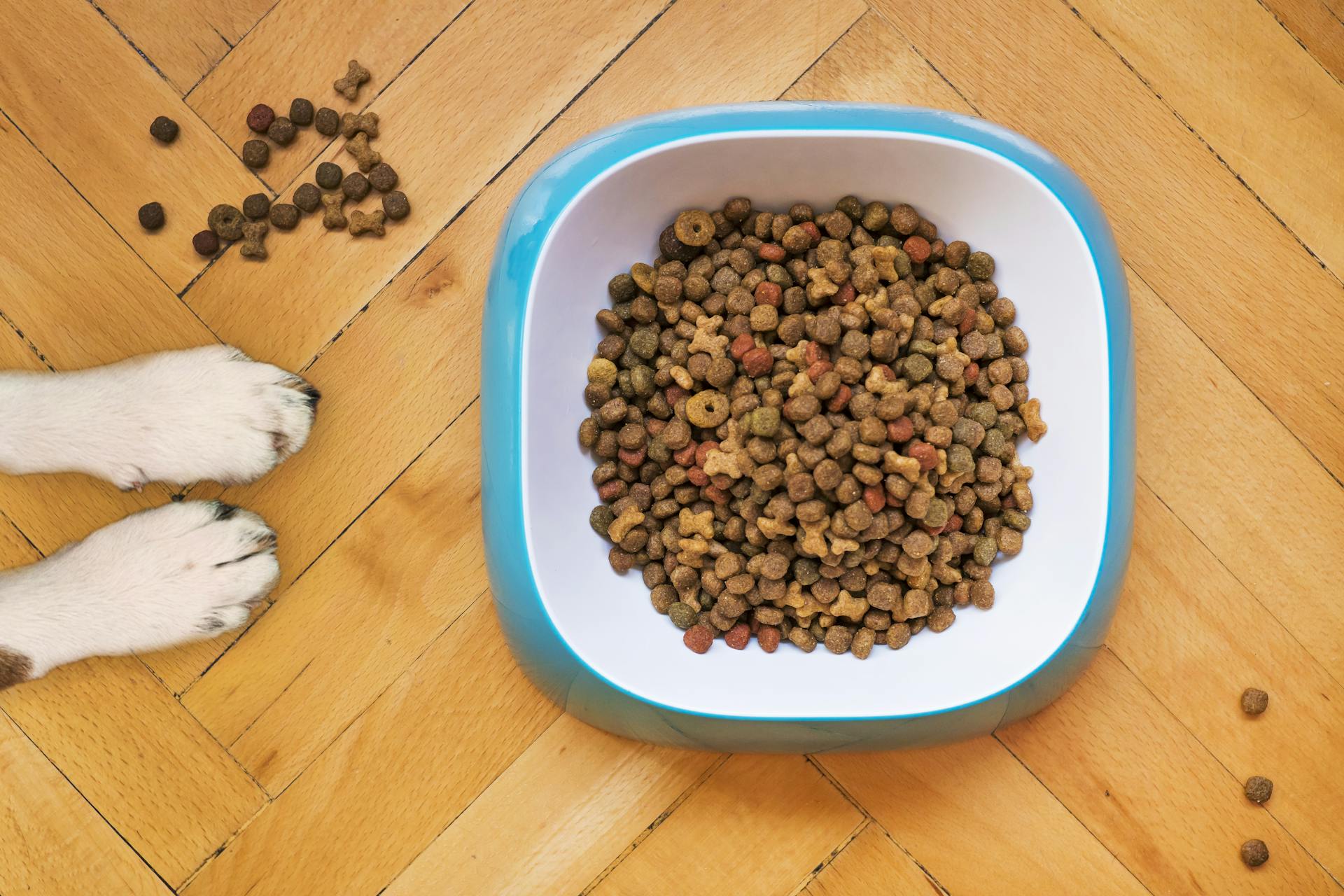
Constipation in dogs can be a real challenge for pet owners. According to research, a low-fiber diet is a common cause of constipation in dogs.
Some foods can help stimulate bowel movements and alleviate constipation. For example, adding pumpkin to your dog's meals can help soften stool and promote regular bowel movements.
A small amount of canned pumpkin can be a great addition to your dog's diet, but be sure to choose a plain, unflavored variety.
Discover more: How to Help Dogs with Skin Allergies
Causes and Symptoms
Constipation in dogs can be caused by a variety of factors, including a lack of exercise, poor diet or sudden diet changes, and not enough fiber. A diet rich in fiber can help prevent constipation in dogs.
Some common symptoms of dog constipation include infrequent bowel movements, straining, hard stools, and vocalization due to discomfort. Your dog may also exhibit other signs of discomfort, such as not wanting belly rubs or restlessness.
Here are some common causes of constipation in dogs:
- Lack of fiber in the diet
- Lack of exercise
- Dehydration or not enough water
- Changes in diet
- Too much dry food
- Physical blockage caused by foreign objects
- Blocked anal glands
- Enlarged prostate gland
- Excessive self-grooming that leads to a blockage
- Side effects of medications
It's essential to identify the underlying cause of constipation to provide the best treatment for your dog.
Common Causes
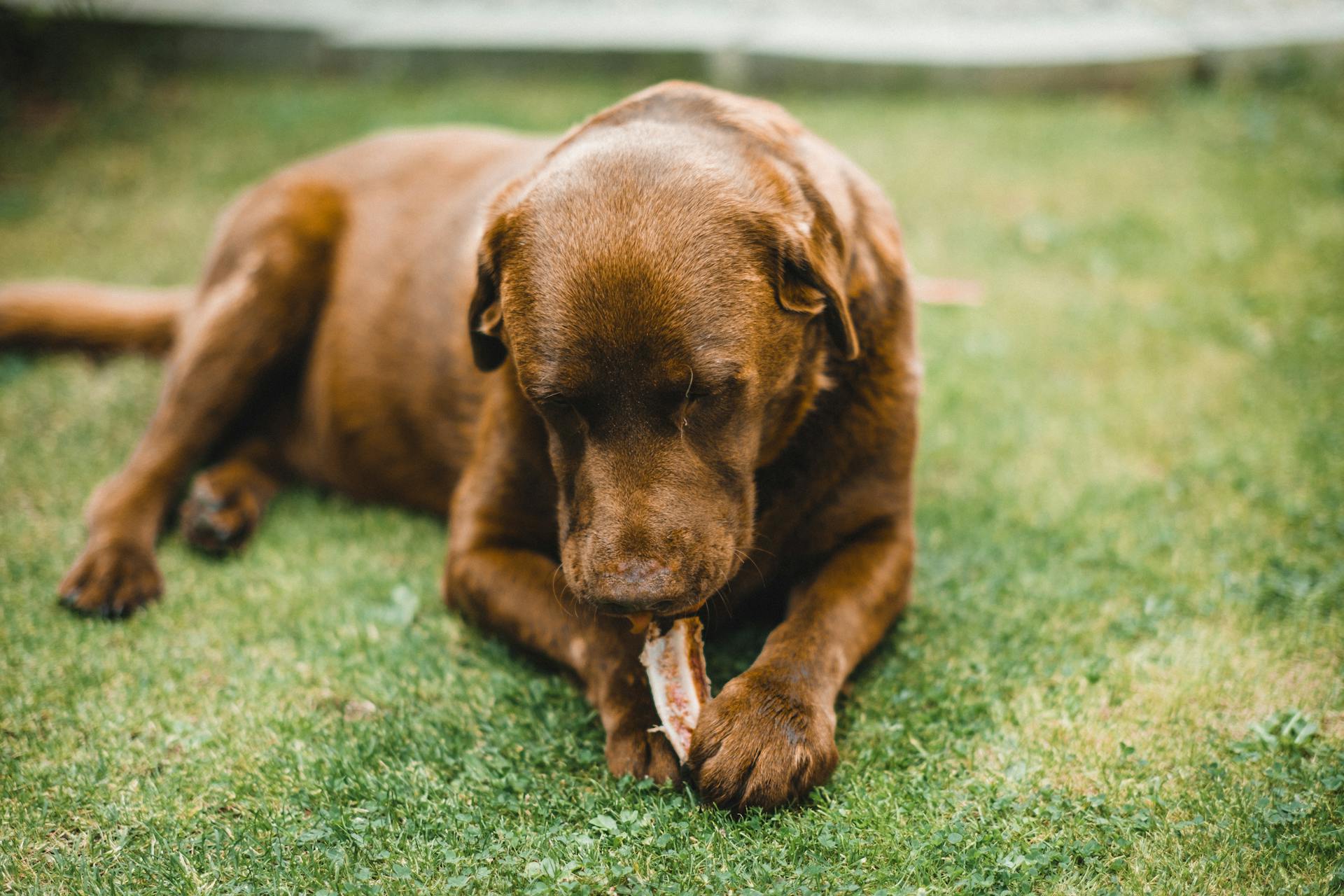
Dogs can get constipated due to a variety of reasons, and understanding these causes can help you identify the root of the problem and take steps to prevent it.
Lack of exercise is a common cause of constipation in dogs. Regular physical activity can help stimulate bowel movements and prevent constipation.
A poor diet or sudden diet changes can also lead to constipation. This is because a dog's digestive system is sensitive to changes in food, and a sudden shift can disrupt the normal digestive process.
Not enough fiber in a dog's diet is another common cause of constipation. Fiber helps move food through the digestive system, and a lack of it can cause stool to become hard and dry.
Dehydration is also a common cause of constipation in dogs. When a dog doesn't drink enough water, the stool becomes dry and hard, making it difficult to pass.
Physical blockages caused by foreign objects, such as bones, gravel, or plants, can also cause constipation. These objects can get stuck in the digestive tract and prevent stool from passing through.
For your interest: Pedigree Dog Food Killing Dogs
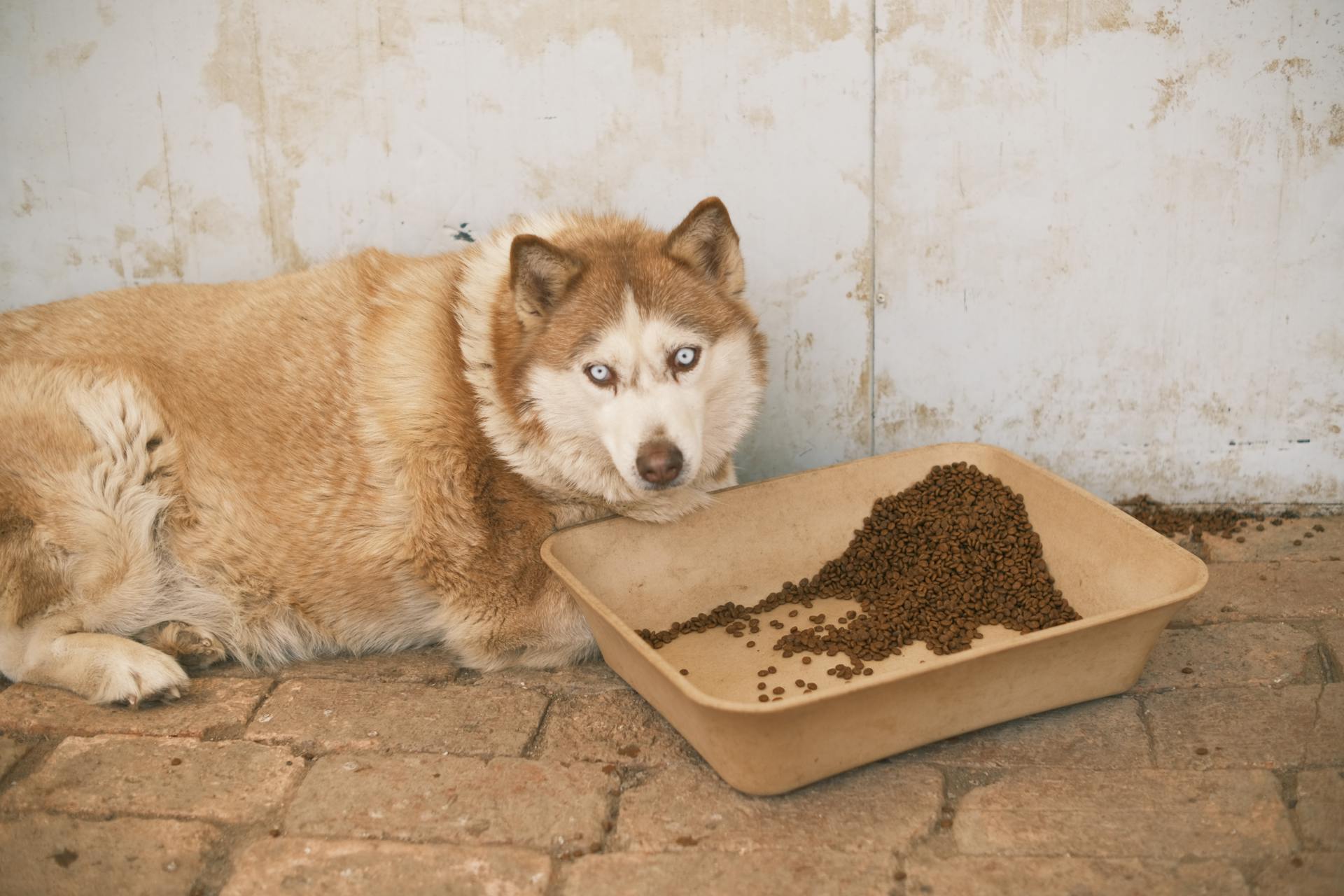
Some medical conditions, such as hypothyroidism, renal issues, and enlarged prostate, can also cause constipation in dogs. These conditions can affect the normal functioning of the digestive system and lead to constipation.
Here are some common causes of constipation in dogs:
- Lack of exercise
- Poor diet or sudden diet changes
- Not enough fiber
- Blockages from eating non-food items
- Dehydration
- Hypothyroidism
- Renal issues
- Enlarged prostate
- Anal gland problems
- Spinal injury
- Certain medications
- Stress or anxiety
- Tumors
- Trauma to the pelvis
- History of constipation
Common Symptoms
Dogs experiencing constipation often exhibit certain symptoms that can be a sign of a problem. Infrequent bowel movements are a common sign, as dogs typically poop at least once a day. Not going for 48 hours or more is a clear indication that something is wrong.
Straining during bowel movements is another symptom, where your dog struggles to go with little to no result. This can be a painful and uncomfortable experience for your dog.
Hard stools are a common symptom of constipation, and they can look like pebbles or nuggets. Your dog's stool may be hard, dry, and difficult to pass.
Vocalization is another symptom, where your dog may whine more than usual or growl when you touch or press their abdomen. This is because constipation is uncomfortable and painful for your dog.
Worth a look: What Are the Symptoms of Constipation in Dogs?

Loss of or reduced appetite is a sign that your dog is feeling uncomfortable after eating. A change in eating habits may be a sign that your dog needs help with constipation.
Here are some common symptoms of dog constipation:
- Infrequent bowel movements
- Straining during bowel movements
- Hard stools
- Vocalization
- Loss of or reduced appetite
- Scooting (dragging their butt across the floor)
- Vomiting (if your dog has eaten but can't defecate)
- Other signs of discomfort
Your veterinarian may prescribe a customized medication to help manage your dog's constipation. These medications are mixed by trained, licensed compounding pharmacists and often come in dosage forms designed to make giving or applying the medication easier and more accurate.
Home Remedies
You can try a few home remedies to help ease your dog's constipation. Pumpkin puree is high in fiber and moisture, making it a great option to regulate the digestive tract. It's best to use 100% pumpkin puree, not pumpkin pie filling.
Canned dog food can also help regulate your dog's digestive system and create softer stool. Mix it with their normal food to avoid an upset stomach.
Dietary fiber supplements can increase fiber in your dog's body, softening their stool and regulating bowel movements. However, it's essential to consult with your veterinarian to recommend specific types and dosages.
For another approach, see: High Fiber Dog Treats Recipe
Access to fresh water is crucial to keep your dog hydrated. Encourage them to drink plenty of water, and if they're not drinking at all, seek veterinary care.
Exercise can also help stimulate a healthy movement in your dog. Take them for long walks, runs, fetch, or chase to promote a healthy digestive tract.
Here are some home remedies you can try:
- Pumpkin puree
- Canned dog food
- Dietary fiber supplements
- Fresh water
- Exercise (e.g., walks, runs, fetch, chase)
You can also try adding coconut oil, olive oil, or vegetable oil to your dog's food to help soften their stool. However, be cautious not to overdo it, as this can cause diarrhea.
Some other options to consider include:
- Coconut oil
- Olive oil
- Vegetable oil
Remember to consult with your veterinarian before trying any new remedies, especially if your dog's constipation persists or worsens.
Treatment and Prevention
If your dog is experiencing constipation, it's essential to work with your vet to determine the best course of treatment. Your vet may recommend changes to your dog's diet, such as a low-residue diet, which can help alleviate chronic constipation.
A unique perspective: Food Diet for Dogs
A high-fiber diet is often recommended, but it's worth noting that fiber can actually aggravate constipation over time. Your vet may suggest a prescription diet with increased fiber or water content.
If your dog's constipation is caused by a medical issue, treatment will focus on correcting that issue and providing supportive care. Your vet may prescribe laxatives or stool softeners specifically for your dog, but be sure to follow their instructions carefully.
To prevent constipation in dogs, it's recommended to provide a high-fiber diet, access to water, and frequent opportunities to defecate. Avoid giving your dog bones, and consider neutering your dog at an early age to prevent prostate growth.
Here are some general guidelines for treating and preventing constipation in dogs:
- High-fiber diet: Dietary fiber helps move things through your dog’s digestive tract.
- Fluid therapy: If your vet suspects dehydration, they may recommend fluid therapy.
- Low-residue diet: A low-residue diet can help alleviate chronic constipation.
- Avoid giving your dog bones.
- Neuter your dog at an early age to prevent prostate growth.
What Is the Treatment for?
The treatment for dog constipation depends on the severity of the condition. For mild constipation, stopping your dog from eating unusual or indigestible food items and providing access to water and a high-fiber diet can help alleviate the issue.
Consider reading: Constipation in Shih Tzu
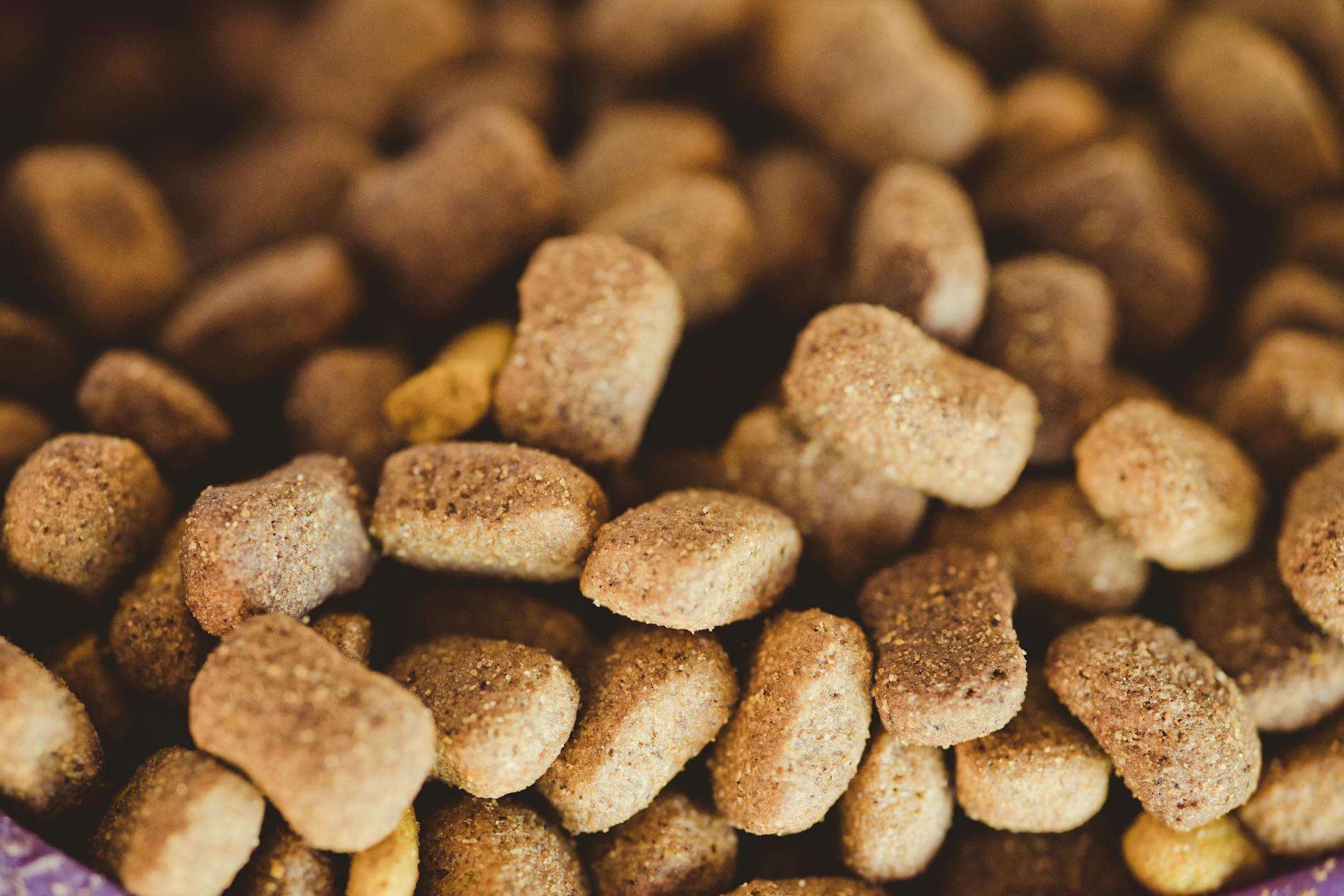
If your dog is experiencing mild to moderate constipation, your vet may recommend admitting your dog for enemas and fluids to rehydrate them. Manual removal of impacted poo may also be necessary in some cases.
In severe cases of constipation, surgery or manual removal of impacted feces may be required to get things moving again. This is usually the case for obstipation or blockages.
Your vet may prescribe laxatives or stool softeners specifically for your dog, but it's essential to follow their instructions and not give your dog any laxatives without their approval. Enemas should also be left to your vet to administer.
A high-fiber diet can help alleviate chronic constipation, and your vet may recommend a prescription diet with increased fiber or water content. Dietary changes can have a significant impact on constipation and other digestive issues.
Here are some noninvasive methods for correcting constipation:
- Laxatives or stool softeners (prescribed by your vet)
- Enemas (administered by your vet)
- Fluid therapy (intravenous or subcutaneous)
- High-fiber diet (prescription diet with increased fiber or water content)
- Other dietary changes (such as switching to canned dog food)
Prevention Strategies
To prevent constipation in dogs, give them a high-fibre diet.

A high-fibre diet is essential to keep your dog's digestive system running smoothly. This means feeding them fibre-rich foods like fruits and vegetables, or using a high-fibre dog food.
Make sure your dog always has access to fresh water to help with digestion and prevent constipation.
Frequent opportunities to defecate are also crucial, so take your dog out for regular walks.
Avoid giving your dog bones, as they can be difficult to digest and may even cause constipation.
Neutering your dog at an early age can also help prevent constipation by preventing the growth of the prostate.
Take a look at this: Fibre for Dogs Food
When to See a Vet
If your dog is circling a lot, dragging their bottom across the ground, or crying out in pain, they could be constipated.
You should pay attention to your dog's daily bowel movements, as constipation should resolve within 48 hours if they get enough water, daily exercise, and a well-balanced diet.
If your dog's feces are small and contain water or mucus, it may look like diarrhea, but it could be a sign of constipation.
You can lightly press your dog's abdomen to feel if it's tense or painful for them.
If your dog shows signs of discomfort or vomiting, you should schedule a veterinary appointment right away to find the cause.
Here are some signs to look out for that indicate you should see a vet:
- The last time your dog had a normal bowel movement
- Stool color and consistency
- Changes in your dog's diet or routine
- Non-food items your dog may have eaten (such as bones or kitty litter)
- Medications
- Injuries
- Straining or pain while trying to go
- Signs of distress or discomfort, especially vomiting, lethargy, or bloating
If your dog hasn't had a bowel movement in 48 hours, contact your veterinarian, as prolonged constipation can be a sign of serious conditions.
Dietary Changes
Adding more fiber to your dog's diet can help alleviate constipation. A high-fiber diet can help soften stool and make it easier to pass.
Increasing the amount of water in your dog's diet is also essential. Dehydration can exacerbate constipation, so ensuring your dog drinks plenty of water is crucial.
Feeding a balanced and nutrient-rich diet is vital for your dog's overall health, and can also help prevent constipation.
Additional reading: Food Elimination Diet for Dogs
Stay Hydrated
Staying hydrated is crucial for your dog's digestive health. Lack of water intake is a common cause of constipation in dogs.
Dogs need to drink one ounce of water per pound of body weight daily. If your dog doesn't like drinking water, you can add low-sodium chicken broth to their bowl as motivation.
Adequate hydration will help keep your dog's digestive system moving correctly.
For more insights, see: Canine Digestive System
Key Takeaway
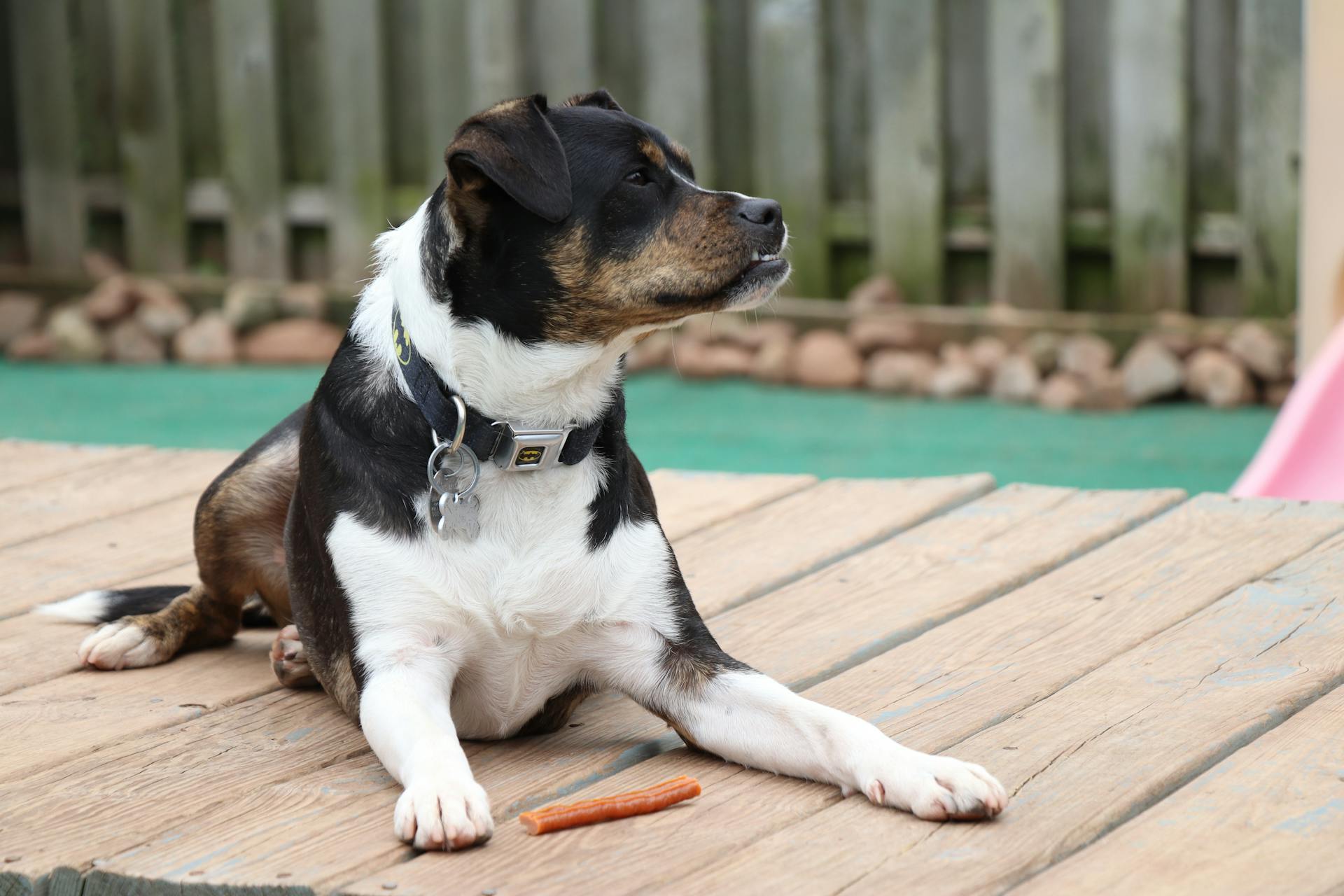
Constipation in dogs can be a real pain for both you and your furry friend. A common cause of constipation in dogs is a lack of water intake, so it's essential to ensure your dog is properly hydrated.
Dogs need to drink one ounce of water per pound of body weight daily. If your dog doesn't like drinking water, you can add low-sodium chicken broth to their bowl as motivation. I've seen many dogs turn up their noses at plain water, but add a bit of broth and they can't get enough!
Dietary changes are often necessary to support constipated dogs. Feeding your dog foods high in fiber can help stimulate their digestive system. Fiber-rich foods include fruits, vegetables, and whole grains. You can also try adding a small amount of canned pumpkin to their meals, which is a natural fiber source.
If your dog hasn't gone in 48 hours or more, contact your veterinarian. Prolonged constipation can be a sign of a blockage or other serious condition. So, if you notice any unusual symptoms, don't hesitate to reach out to your vet.
Here are some general guidelines for preventing constipation in dogs:
- Ensure your dog is drinking enough water.
- Feed a high-fiber diet.
- Exercise your dog regularly to help stimulate their digestive system.
- Monitor your dog's bowel movements and contact your vet if you notice any unusual symptoms.
Frequently Asked Questions
Are scrambled eggs good for dogs with constipation?
Yes, scrambled eggs can be a helpful addition to a dog's meal to help with constipation, especially when combined with other easily digestible ingredients. Consider pairing scrambled eggs with white rice and boiled chicken for a balanced and moisture-rich meal.
Does peanut butter help dogs with constipation?
Yes, peanut butter can help soften stool and lubricate the colon, making it easier for dogs to pass constipated stool. However, consult a veterinarian before using peanut butter as a treatment for constipation in dogs.
How to manually help a dog poop?
To manually help a dog poop, gently rub their anus in a circular motion with a baby wipe to stimulate a bowel movement. This technique can encourage your dog to poop on demand.
Sources
- https://www.webmd.com/pets/dogs/dog-constipation-causes-treatment
- https://www.vets-now.com/pet-care-advice/constipation-in-dogs/
- https://www.dutch.com/blogs/dogs/dog-constipation-home-remedies
- https://www.wedgewood.com/blog/posts/10-home-remedies-for-dog-constipation.html
- https://be.chewy.com/top-constipation-remedies-dogs/
Featured Images: pexels.com

